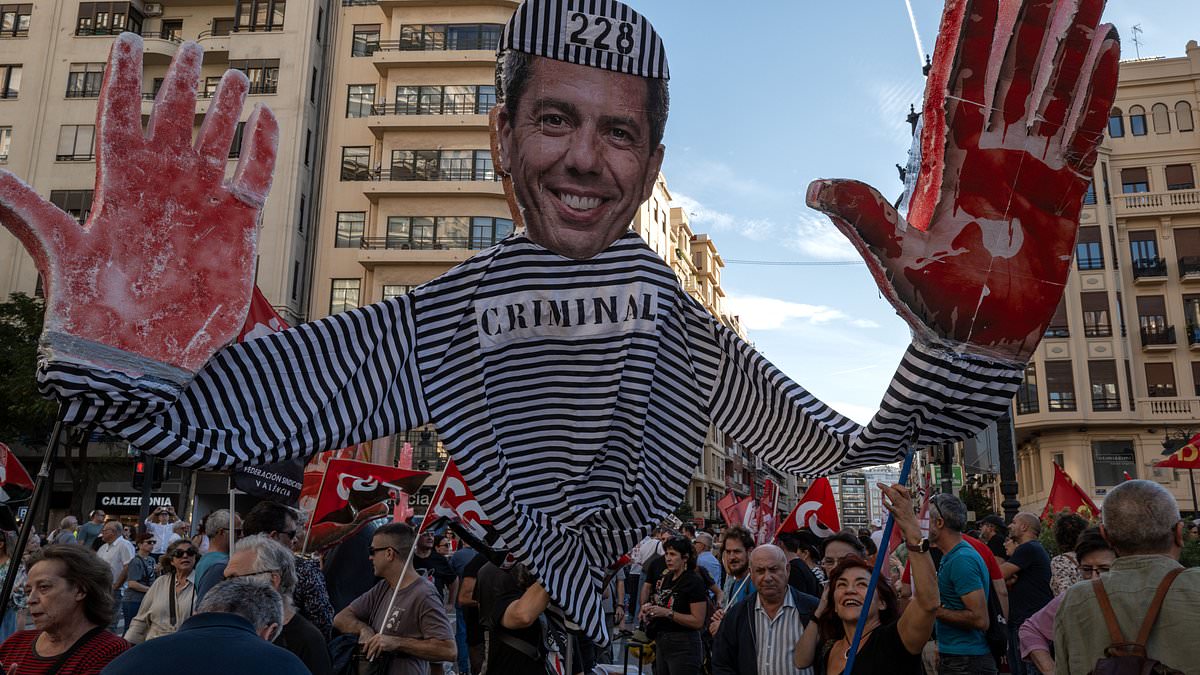Copyright dailymail

Tens of thousands of furious protesters have taken to the streets of Valencia one year on from the deadly flash floods that killed 229 people. Demonstrators, many carrying photos of the victims, denounced the handling of last October's disaster and called on regional leader Carlos Mazon to resign. The floods also took a severe toll on the infrastructure in the region, sweeping away hundreds of cars in their wake and submerging fields under mud. It was Europe's worst flood-related disaster since 1967 when at least 500 people died in Portugal. 'People are still really angry,' said Rosa Cerros, a 42-year-old government worker who took part in the protests with her husband and two young daughters. 'Why weren't people evacuated? Its incomprehensible.' Mazon's administration has been heavily criticised for not sending text alerts until the flooding had already taken hold across some parts of the Valencia region. The messages were sent more than 12 hours after the national weather agency had issued its highest alert level for torrential rains. Residents told Spanish media that by the time they received the alert, muddy water was already surrounding their cars, submerging streets and pouring into their homes. The floods hit 78 municipalities, mostly in the southern outskirts of the city of Valencia, killing 229 people in the region. The body of one victim was found as recently as Tuesday. Despite warning signs, Mazon went ahead with an hours-long lunch with a journalist on the day of the floods. He also appeared in photos tweeted by his staff receiving a sustainable tourism certification. More than 50,000 people took part in today's protest, according to the central government's office in Valencia. Demonstrators made their way through the streets of Spain's third-largest city holding placards calling on Mazon to resign or even be imprisoned. Under Spain's decentralised system, disaster management is the regional administration's responsibility. But Mazon, a member of the conservative Popular Party (PP) that sits in opposition to the Socialist-led national government, has argued his administration did not have the information needed to warn people sooner. In a poll published earlier this month in El Pais newspaper, 71 percent of Valencia residents said Mazon should resign. Almost half of the people who died in the catastrophic floods were 70 or older, a fact highlighted by some protesters. They accuse the authorities of having failed to protect the most vulnerable. Rosa Alvarez, who heads an association representing victims of the floods and was among those leading the march, blames the regional government's inaction for her 80-year-old father's death. He was already drowning by the time the mobile phone alert was issued, she said, after the walls of his home in Catarroja were knocked down by the floods. 'Every minute counted that day. When the alarm sounded people had already drowned or were in real danger,' the 51-year-old social worker said. 'All those deaths were completely preventable.' Campaigners have staged regular demonstrations against Mazon often on or near the monthly anniversaries of the disaster. The PP's national leader, Alberto Nunez Feijoo, continues to back Mazon despite his unpopularity. Anton Losada, a politics professor at the University of Santiago de Compostela, told AFP Feijoo 'he has no other choice'. Mazon's resignation would trigger early elections in Valencia, which would probably be 'catastrophic' for both the PP and Feijoo's leadership, Losada told AFP. The party is hoping a successful reconstruction effort will help restore its standing, he added.



